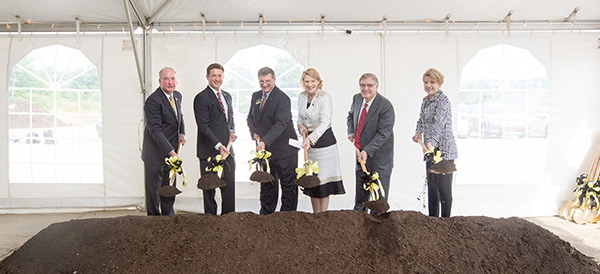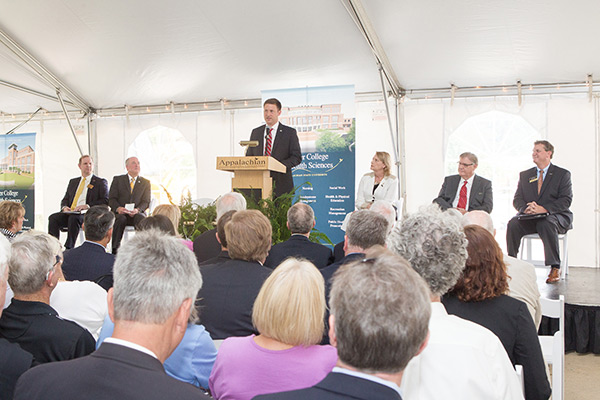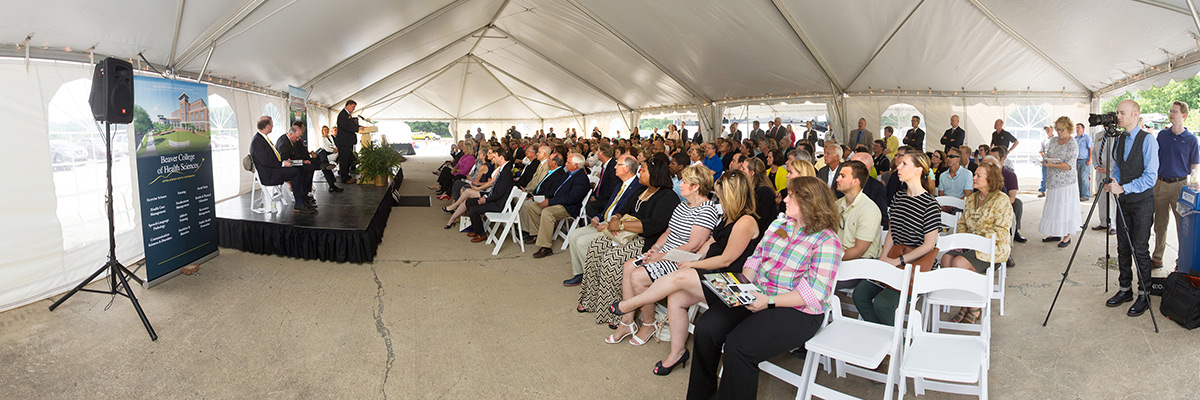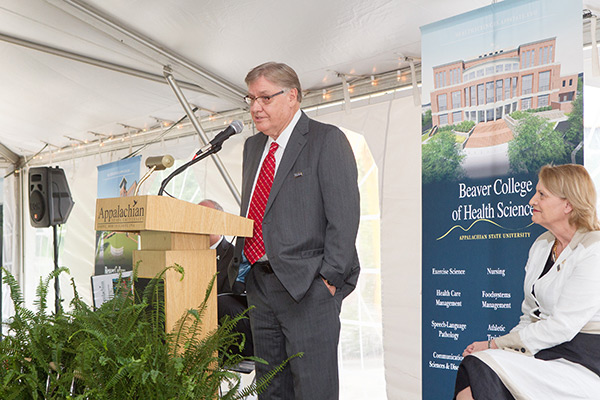
University, health care and state officials ceremoniously break ground on the new health sciences building at Appalachian State University. Pictured left to right are Richard Sparks, president and CEO of Appalachian Regional Healthcare System; Andrew T. Heath, budget director for the State of North Carolina; Frederick K. Whitt, founding dean of the Beaver College of Health Sciences; Chancellor Sheri N. Everts; Donald C. Beaver, Appalachian State University Board of Trustees member; and Vickie Beaver.

Andrew T. Heath, budget director for the State of North Carolina, speaks on behalf of Gov. Pat McCrory to attendees at the June 23 groundbreaking of the Beaver College of Health Sciences building. With him on the dais are, from left, Appalachian’s Provost Darrell Kruger, Appalachian Regional Healthcare System President and CEO Richard Sparks, Chancellor Sheri N. Everts, Donald C. Beaver and Dean Frederick K. Whitt.
BOONE—Under sunny skies and with a row of black and gold beribboned shovels at the ready on the sidelines, Appalachian State University Chancellor Sheri N. Everts welcomed more than 300 guests to the official groundbreaking of the Beaver College of Health Sciences (BCHS) facility, Thursday morning, June 23. University faculty, staff and students, project partners, government officials and interested members of the High Country community gathered under a tent at the BCHS building site located adjacent to Watauga Medical Center.
“This is a great day,” Everts said. “Our project is shovel-ready and we will begin work within the next month. This is possible due to two years of planning money from the North Carolina General Assembly.”
Construction of the 203,000 square foot facility is in part funded by $70 million allocated from the recently passed Connect N.C. bond. “Our state will benefit from this investment, and thanks to the bond a home for the Beaver College of Health Sciences is now a reality,” Everts said.
Nearly 20 percent of Appalachian’s students are taught by Beaver College of Health Sciences faculty. Including nursing, there are six departments and 16 undergraduate and graduate degrees offered in the college, from disciplines including communication sciences and disorders, and nutrition and health care management.
Everts recognized President and CEO of Appalachian Regional Healthcare System (ARHS) Richard Sparks and the ARHS board of trustees. The board has partnered with the university through more than 10 years of planning and donated the 9.2-acre parcel of land on which the building will be constructed.
A long journey
Sparks told the gathering, “This journey has been long. I’d like to note the leadership over the last 10 years that brings us to this place, at this time. The dream was held by many.” He recognized leadership from all sectors but especially the board of trustees at ARHS. “This place, this college,” he concluded, “will be special because the leadership to get us here has been genuine, focused and meaningful. I want to thank all the leaders, past and present, who made this day possible.”
Introducing N.C. State Budget Director Andrew Heath, on site to speak for Gov. Pat McCrory, Everts said, “With the help of our friends in the General Assembly, the governor helped initiate and lead the bond campaign and we owe him and his entire staff a great deal of support and gratitude.”
In his remarks, Heath said this is the first bond-funded project to get underway. He said McCrory initiated the bond in support of education, parks, public safety and infrastructure because he knew “if we wait to react to growth, we have waited too long.” North Carolina is the ninth fastest growing state in the nation, he said.
Because North Carolinians supported the bond, Heath said, “Future generations of students will have the opportunity to study health sciences here at App State in the state-of-the-art Beaver College of Health Sciences building. This facility will help prepare students for high demand medical careers and further enhance health and quality of life in the region and in the state.”
An historic occasion
Following Heath’s comments, the chancellor introduced Donald C. Beaver as “an Appalachian alumnus and pioneer in health care” for whom the college was named in 2015. Everts noted that after receiving his Bachelor of Science degree from Appalachian in 1962 and a Master of Arts degree in 1964, Beaver found work at Watauga Hospital (now Watauga Medical Center.) “Now his leadership and vision are building a bright future for his alma mater and the system where he began his career,” Everts said.
In his comments, Beaver said it was “an honor to be part of this historic occasion. We have to recognize the staff of App for the job they’ve done in planning.” Because of their forethought, he said, “Architectural plans are ready and the building is ready to go.”
Beaver recognized Pat Rodgers, president and CEO of Rodgers Builders, whose firm will do the construction. He said Rodgers’ firm had done a fine job constructing the BB&T Charlotte Knights’ ballpark and said he was confident they’d do a fine job at Appalachian as well. Beaver went on to say there is “a lot of demand in the healthcare sector throughout North Carolina, the Southeast and particularly in western North Carolina, where we have shortages of nursing and in other areas. This will fill a big void in the health care industry.” With a nod to the need for further funding, Beaver jokingly reminded the audience, “I guess this building needs a name on it, too.”
Fourteen of the 16 existing programs in the Beaver College of Health Sciences will be housed in the new building, as well as the Wake Forest Physician Assistant Program and the Blue Cross Blue Shield of NC Institute for Health and Human Services. The new building will house high-tech and innovative classrooms, faculty offices, a student information commons and gallery, a student leadership and success center, an inter-professional health clinic, food innovation and exploration labs, exercise physiology and human performance labs, nursing simulation and clinical innovation, rehabilitative science labs, human anatomy and physiology labs, human cadaver lab, and numerous problem-based learning classrooms.
More than a place to live and work
“Buildings and their footprint,” Founding Dean Frederick K Whitt said, “represent more than a place to live and work. Buildings are symbols of our culture, our environment and our values. Someone asked me why we are moving our programs and building away from campus. My response was we are not moving away from campus, we are moving toward the community and region, symbolic of the efforts of our college to engage with our community and regional partners to enhance health and quality of life.”
Whitt acknowledged Paul Boney, vice president of LS3P and his team of architects, led by Scott Baker, and Rodgers Builders saying, “We have a first-class team of fellow North Carolinians … who will deliver an outstanding building on time and within budget.”
Whitt also recognized strategic partner Wake Forest School of Medicine and its dean, Dr. Ed Abraham, who was in the audience. The inaugural class of the Boone cohort of Wake Forest School of Medicine physician assistant (PA) students graduated with Master of Medical Sciences degrees in May. The cohort launched in June 2014 and marked the first class of Wake Forest PA students to study on the Appalachian campus.
In closing, Provost Darrell Kruger told the audience, “This new facility is critical to our academic mission and a powerful example of how a university can be of service to our community and our state. The increase in access to quality health care will increase life expectancy for citizens in North Carolina and, as better health care lowers health care costs, future health care costs could decrease.”
About Appalachian State University
As a premier public institution, Appalachian State University prepares students to lead purposeful lives. App State is one of 17 campuses in the University of North Carolina System, with a national reputation for innovative teaching and opening access to a high-quality, cost-effective education. The university enrolls more than 21,000 students, has a low student-to-faculty ratio and offers more than 150 undergraduate and 80 graduate majors at its Boone and Hickory campuses and through App State Online. Learn more at https://www.appstate.edu.
What do you think?
Share your feedback on this story.



![How NCInnovation Is Rethinking Economic Development in North Carolina [faculty featured]](/_images/_posts/2026/02/rethinking-economic-development-600x400.jpg)









